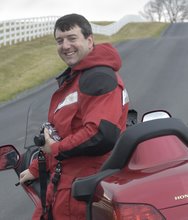Monday, June 16, 2008
Wednesday, June 11, 2008
Saturday, June 7, 2008
Swivel Hitch Installation Video
Some riders feel there is sufficient range of motion in the existing coupling to accommodate their riding style while other riders feel a swivel is essential. Then too, there are occasions when the motorcycle's lean can exceed the range of the joint and twist the trailer tongue. Hopefully this will only happen at low speeds, e.g. a tip-over in the parking lot or dropping the bike in a tight U-turn; I've done the former and heard from someone who has done the latter. In either case, it's possible the bike might lean too far, twisting the tongue.
Here's a little five-minute video I put together that demonstrates how a swivel is installed on a cargo trailer.
Click this link to order a swivel hitch for your motorcycle trailer.
Wednesday, June 4, 2008
Motorcycle Touring Do's and Don'ts
I had the chance recently to take my first extended ride of the '08 season and it reminded me of some lessons about motorcycle travel I've learned (and relearned) over the years. Funny, even though I write often on this topic, I still find myself, usually somewhere along the road, thinking "I should have known [insert travel pearl of wisdom here]." Here are a few things that re-occurred to me over the weekend.
DO bring backup maps and DON'T rely exclusively on a GPS. Three hours into my four-day trip, the GPS quit (that's strike two, Garmin) and I found I'd neglected to pack my DeLorme Gazetteer. It wasn't a deal killer for this trip, but had I been venturing into unfamiliar territory, it would have been a problem. I did at least have Street Atlas on my laptop, so I could browse routes each night and make notes.
DO choose boxers over briefs. I've found over the years that brief-style undershorts contribute to short rides because the elastic bands around the legs begin to chafe in delicate areas. Boxers or better yet, bicycle pants, are more comfortable over the long haul. Bike pants in particular are well padded in critical areas and significantly increase comfort on sport-oriented bikes with a forward-cant seating position that keeps you balancing on your nethers.
DO at least one shakedown run of any new gear before your "big" trip. I can't emphasize this enough. Week after week I get frantic calls from folks here at the shop, looking to bolt a trailer onto their bike and, oh by the way, they're leaving in a couple of days. Whether its a GPS, new tires, or anything else new to you, you will enjoy your trip a lot more if you add those gadgets and become accustomed to their operation well before your trip. This is especially true with any new riding gear. If you are planning to buy a new helmet or boots, purchase these at least a couple months in advance and wear them as much as possible to ensure they're well broken in. It's no fun to discover that your new helmet doesn't fit well or your boots pinch when you're at the end of day one on a ten-day trip.
DO have aspirin or ibuprofen handy. Take the recommended dose in the morning before you start riding and this will help ease muscle fatigue during the day.
Believe it or not, you'll feel fresher at the end of the day if you DO use earplugs on your ride. You may not pay attention to wind noise, but your brain is still processing it. Earplugs are especially good at filtering out white noise, while still allowing you to hear your bike and important sounds like sirens. In fact, I can hear sirens from a greater distance while riding WITH earplugs because the extraneous sounds around me are filtered out. When you hop off the bike and pop out the plugs after a long ride, you will be able to detect a noticeable difference in the sharpness of your hearing.
If you think you will need a tire change on your trip, DO coordinate that in advance, especially if you are choosy about your tires. Based on your tire's estimate remaining life (be conservative), figure out about where that will fall on your trip and contact a dealer in that area to reserve a set of tires. If your tires are within 1,000 miles of the end of their service life, replace them before your trip. When I returned home, my rear tire was shot. If I'd been on a longer trip, that could have cost me a day or two waiting on replacements that might not have been my preferred tire.
And finally, DO stay hydrated. Throughout your ride, that wind in your hair is taking moisture along with it. If you start feeling draggy, fatigued, or begin developing a headache, you own machine may just be low on water.
I hope you enjoy a safe and exciting riding season!





